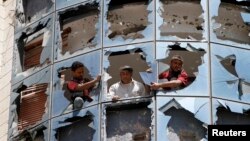A suicide bomber linked to al-Qaida drove a car laden with explosives into a hospital used as a base by Yemen's Shi'ite Muslim Houthi movement on Sunday, killing at least 15 people, various sources said.
The attack took place in the town of Majzar in Maarib province, east of the capital Sana’a, militant, tribal and local sources said.
Houthi fighters seized Sana’a on September 21 after four days of fighting with soldiers loyal to the Sunni Muslim Islah party.
They have since refused to leave the capital, despite an agreement they signed with President Abd-Rabbu Mansour Hadi to make them a part of the government.
"Dozens of dead and wounded from the rejectionist Houthis in a martyrdom operation by Ansar al-Sharia using a booby-trapped car in Maarib," the militant group, which is the local branch of Al-Qaida in the Arabian Peninsula (AQAP), said in a statement on its Twitter account.
Houthi headquarters
The group said the target was al-Jafra hospital, which had been turned by the Houthis into a base for their operations in the area. Local tribesmen said at least 15 people were killed in the attack and more than 50 were wounded.
There was no immediate word from the Houthi, who are named after a Zaydi tribe based in the city of Saada some 540 kilometers (336 miles) to the north.
Earlier Sunday, hundreds of Yemenis demonstrated in Sana'a, demanding that Houthi rebels who had seized control of the capital last week leave, a day after the Shi'ite Muslim fighters attacked the home of the intelligence chief.
Witnesses said activists chanted slogans against President Hadi for his apparent weakness before the Houthi fighters.
"You Hadi, find a solution, or else turn around and depart," demonstrators chanted.
One sign carried by Sunday's protesters called for a "secure capital free of armed militias."
On Saturday, Houthi fighters tried to fight their way into the home of Yemen's intelligence chief in Sana'a, in a clash that left one soldier and two tribesmen dead. The incident, which also wounded six soldiers and nine Houthis, showed the fragility of the power-sharing deal.
Militant group
Ansar al-Sharia had previously carried out numerous attacks on military and civilians installations of the U.S.-allied Yemeni government.
But the group, which adheres to an austere brand of Sunni Islam which views Shi'ites as heretics, has turned its attention to the Houthis after they captured Sana’a.
Last week, they said they carried out a similar attack on the Houthis in their northern stronghold of Saada province, in which dozens were killed or wounded.
The stability of Yemen is a priority for the United States and its Gulf Arab allies because of its position next to Saudi Arabia and shipping lanes which run through the Gulf of Aden.
Saudi Foreign Minister Prince Saud al-Faisal told the U.N. General Assembly on Sunday that the situation in Yemen posed a threat to international security, and said the agreement to form a new government had been wrecked by the Houthis' failure to give up control of the capital.
The U.S. State Department on Saturday condemned the ongoing violence in Yemen and voiced support for President Hadi as he tries to implement the Peace and National Partnership Agreement.
The United States called on all parties to implement all aspects of the peace agreement, in particular the turning over of all medium and heavy weapons to the state.
The State Department said the United States is stepping up efforts to work with the international community to pursue sanctions against individuals who are threatening Yemen’s peace, stability, and security, if they do not immediately stop such activities.
Houthi background
The Houthis captured Sana’a after overrunning an army brigade affiliated to the moderate Isalmist Islah party, making them effectively the power brokers in the country.
Their Zaydi Shi'ite sect is related to but separate from the sect the rules Iran. They make up 30 percent of Yemen's population of 25 million and ruled a kingdom there for 1,000 years.
But they have complained of being marginalized since their last king in Sana’a was overthrown in a 1962 revolution.

